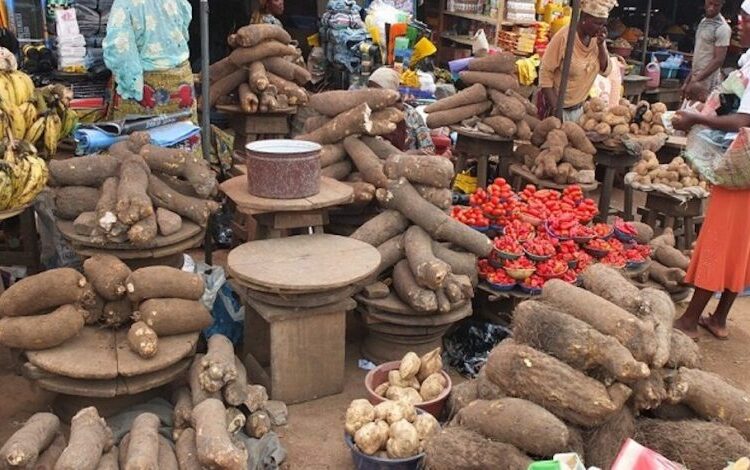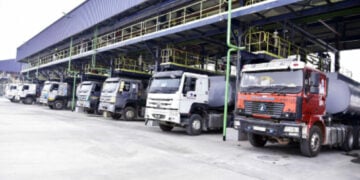Despite declaring a state of emergency on food security and the renewed interest among young people in embracing agriculture, Nigeria lags significantly behind its global counterparts in adopting precision agriculture and other innovative practices.
LEADERSHIP recalls that President Bola Ahmed Tinubu had declared a state of emergency on food security on July 13, 2023, one of the first policies of the then new administration after the removal and fuel subsidy and floating the naira caused prices of goods and services to rise exponentially.
The president’s then spokesman and later minister of Solid Minerals Development Dr Dele Alake, who announced this after a federal executive council meeting, said that security architecture would be ramped to safeguard farmers in their fields, irrigation facilities would be provided, and that food commodity boards would be introduced, among other things.
Many experts had voiced support to the president’s initiative but insisted that securing the farmlands and the farmers and adoption of agricultural mechanisation were key to achieving the goals of the policy.
Sadly, despite the Tinubu administration’s best efforts in fighting insecurity, farmers are still being killed regularly by terrorists who even charge them huge taxes to access their farms during planting and also during harvesting.
Also, LEADERSHIP’s findings revealed a gap in the uptake of agricultural technology that could undermine Nigeria’s food security ambitions.
While countries like the United States, Brazil, China, Australia and the Netherlands reap enormous benefits from embracing innovative farming methods, Nigeria’s agriculture sector remains largely dependent on traditional, labour-intensive practices.
The United States, with 28 per cent of its farmers using precision and other smart-agriculture tools, has seen a 22 per cent yield increase. Brazil’s low-till practices, biologicals, and precision agriculture hardware result in an over 57 per cent increase in farmers’ income and a staggering 97 per cent reduction in soil erosion, according to media reports.
Similarly, the Netherlands has recorded 30–40 per cent efficiency gains through cutting-edge technologies such as advanced greenhouses, robotics, and imaging tools.
China has achieved 60 per cent mechanisation, leading to increased productivity. Australia has over 79 per cent no-till farming, and AI tools such as robotic pollination have increased productivity.
Conversely, Nigeria’s farming technology landscape tells a different story.
Studies show that less than 1 per cent of farming households own tractors, and only 6 per cent of arable land is irrigated. It was gathered that 70 per cent of farmers still depend on crude implements, indicating low mechanisation levels across the country.
Further findings by LEADERSHIP show that farmers in northern Nigeria, especially in Gombe and Bauchi states, indicate a high willingness to adopt precision agriculture technologies, with rates of about 92 per cent in Gombe and 96 per cent in Bauchi. Farmers, particularly the younger generation, are open to embracing digital tools such as mobile applications, drones, and precision inputs.
However, challenges such as high costs, lack of technical know-how, and limited access to financing persist, stifling actual adoption.
Speaking to LEADERSHIP, Arc Kabir Ibrahim, national president of the All Farmers Association of Nigeria (AFAN), stressed that the nation’s food production goals are unattainable without embracing modern farming techniques.
“I do not think we can achieve high yields or any meaningful productivity rise without innovation, which comprises the deployment of technology such as precision agriculture,” Ibrahim said.
He told LEADERSHIP that smallholder farmers use farming technology relatively little. The government must support them with tools and mechanisms to acquire modern innovations that can scale their productivity. ”
Even though authorities in the agriculture sector would not speak on the issue, the federal government’s declaration of a state of emergency on food security in July 2023 stressed a growing national crisis driven not only by insecurity and climate change but also by the slow adoption of agricultural technology among its farmers.
While countries with similar agricultural profiles have made strides through precision farming and climate-smart innovations, Nigeria’s slow pace in embracing such technologies threatens its food systems, which are mostly vulnerable to shocks.
The emergency has also shown structural weaknesses within the agricultural sector, particularly the limited modernisation of farming practices. In many rural communities, farmers still rely on rudimentary tools and traditional methods, often passed down for generations.
Access to affordable, improved seeds, irrigation systems, mechanised equipment and digital tools remains minimal due to poor infrastructure, high costs, low digital literacy and lack of robust support for farmers.
While climate-induced challenges affect food production, Nigerian farmers cannot rely solely on the most commonly adopted innovations, such as herbicide spraying, fertiliser application, pesticide use, and improved seeds.
Jerry Olanrewaju, founder of Jet Farms and Agro Solution Ltd, shared similar concerns with LEADERSHIP.
Having worked for over a decade at the intersection of technology and agriculture, Olanrewaju highlighted how tools like mobile disease detection apps, mechanised harvesting and digital marketing platforms transform farming outcomes.
According to him, the adoption level of these technologies remains very low among Nigerian farmers.
“At Jet FarmsNG, we use our platform Farm2C to improve visibility, traceability, and market access. Our farmers now sell before harvest and receive real-time updates, which motivates smartphone ownership and use”, he explained.
He added that while adoption has improved since 2020, affordability and digital literacy remain critical barriers.
“Many farmers still can’t afford smartphones or data, so capacity building and rural infrastructure are just as crucial as the tools themselves,” Olanrewaju added.
Despite having 77 per cent of its landmass classified as arable, Nigeria’s agriculture sector is not keeping pace with technological advancements.
According to researchers, Achoja Roland Onomu and Michael Aliber, the country suffers from low investment in agricultural technology and ineffective use of Information and Communication Technologies (ICTs).
With two years to the end of the federal government’s National Agricultural Technology Innovation Plan (NATIP), stakeholders are still advocating a multi-pronged approach to scale up technology adoption in Nigeria’s agricultural sector.
Olanrewaju emphasised the need for inclusive innovation.
“While adoption remains low, there is growing optimism. The government has a critical role in making AgTech more affordable, accessible, and scalable.
“It’s not just about making technology available; it must also be affordable, relatable, and inclusive, especially for women, youth, and the most underserved communities,” he said.





